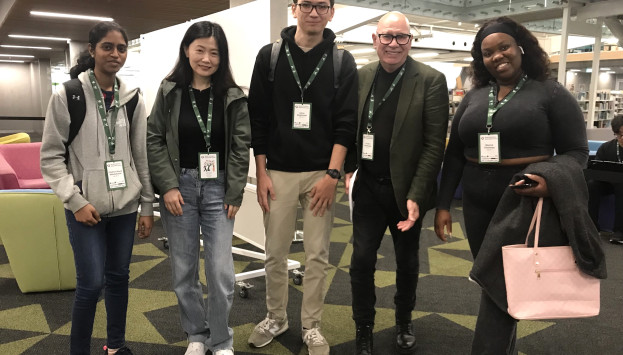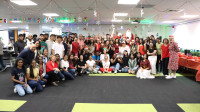A group of Information Technology students showcased their innovative AI project at a Hackathon, where they developed a tool to analyse data from heavy machinery.
Their success has led to an invitation to present to industry, and they'll continue refining the project in their final year of study.
The GenAI Hackathon: Sustainable Impact event, held over three days at Unitec this month, was all about turning ideas into reality by building generative AI-powered apps.
The OPAIC team was made up of Bachelor of Information Technology students Nikita Mogilevskii, Liman Wu, Mazhar Feizi, and Mitchelle Chinhanga, and mentored by Senior Lecturer Barry Dowdeswell.
The team’s project was all about using AI to analyse data collected from heavy machinery.
“Our idea is to collect data from the sensors and then analyse and predict failures and issues to prevent them in advance. It could be used in professional, scientific, and technical services, as well as in construction and agriculture,” they said.
According to their proposal, much of the preventative fault finding and maintenance that is done today relies on expert humans, which could be time consuming.
Their new approach using Generative AI could help businesses cut expenses by having predictable maintenance that reduced downtime of machines.
“It can be a new standard for modern machinery to have a self-diagnosing AI that predicts maintenance to avoid potential hazards, especially if a human is involved in operating,” said the team.
The Hackathon event was just a gateway for the project. The team hopes to continue their work on it during the final year of their degree next year.
“We believe we can deliver a viable system with one year of development and also trial it with real machinery. One of the leading developers has worked as a Heavy Machinery Operator for three years, so he knows how this type of machinery works.”
Senior Lecturer Barry Dowdeswell said that by the end of the Hackathon, the team had an Artificial Intelligence solution prototype that was finding example machinery faults in data.
“That was a huge step forward,” said Barry.
The team has also been invited to visit the Head of Maintenance at TR Group in Auckland to present their project. TR manages over 6,000 heavy vehicles from their base in Penrose Auckland.
Head of Department for IT, Farhad Mehdipour, said teams from OPAIC and Future Skills gave it their all at the Hackathon, showing incredible dedication and enthusiasm.
“I am sure this experience helped them learn a lot of new things,” said Farhad.
Published on 18 Oct 2024
Orderdate: 18 Oct 2024
Expiry: 18 Oct 2054





